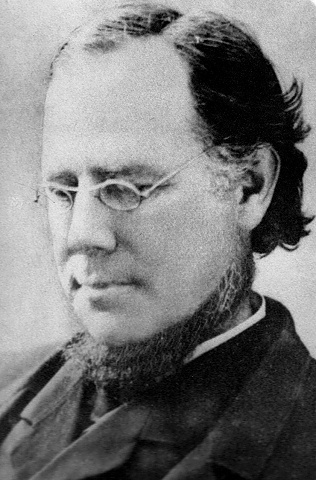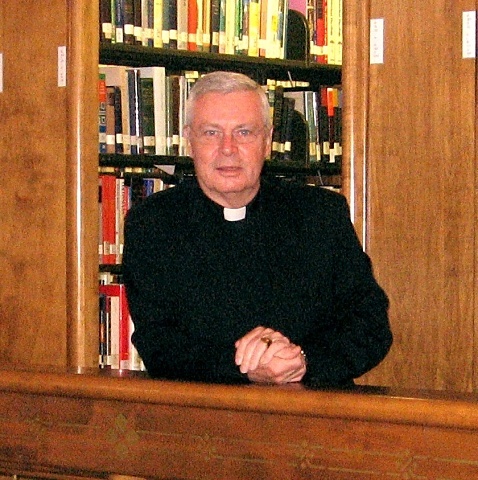October 22, 2012
This is the twenty-seventh in a series of previously unpublished reflections from the 1854 spiritual notebook of Paulist Founder, Servant of God Father Isaac T. Hecker. The reflection series is being made pubic in conjunction with Father Hecker’s cause for canonization. Father Paul Robichaud, CSP, Paulist historian and postulator for Father Hecker’s cause for sainthood, offers a response to Father Hecker’s reflection.

I have often determined to read only writings on the spiritual life written by the saints. For no matter how clever other writers may be they fail to inspire that inner confidence and give that peace to the soul which the saints do. Unlike the saints they write from learning and principles instead of being guided by the instinct of the Holy Spirit. St. Philip (Neri) said he preferred always those books which began with an “S.”
We ought to read spiritual books not to find out some new or easy way to arrive at perfection but to find helps to go the way God would lead us. He who goes out of God’s way to perfection is like a railroad car off the track.
Some people when they read (spiritual books) plunge right into it and are all lost and absorbed. This is wrong; for one ought to be free, recollected and profit as one goes along, and from time to time stop to think, and look for light and inspiration.

Servant of God Isaac Hecker, unlike the other early Paulists, was primarily self-educated, having dropped out of school at the age of 11 in order to assist his older brothers John and George in the bakery business. Independent reading became his principal form of education through his time with the Transcendentalists. Even during his seminary education in Belgium his religious superiors, sensing his discomfort with formal classes finally gave him permission for independent reading as long as he passed his exams. Young Hecker passed with good grades and was ordained on Oct. 23, 1849. From his novitiate year at St. Trond and up through the writing of his Spiritual Notebook in 1854, Father Hecker preferred reading the writings of the saints, especially the mystics.
Writing in later life about his seminary experience, he noted that it was the lives of the saints and the grace of God that made his religious formation intelligible. St. Theresa of Avila, St. John of the Cross and St. Catherine of Genoa were principal spiritual directors for him in the early stages of his spiritual formation. He then read extensively the writings of St. Alphonsus Liguori, the founder of the Redemptorists; through the interpretation of the Jesuit Spiritual theologian Louis Lallemant he became familiar with the Spiritual Exercises of St. Ignatius Loyola. Hecker loved Lallemant because of his focus on discerning the internal guidance of the Holy Spirit, what would become a major theme in Hecker’s own writing.
Father Hecker writes that the best way to approach a spiritual book is leisurely; to not plunge into this kind of writing and get lost. Rather one should stop, read and re-read passages letting the wisdom contained within the words of the saint take hold. As he writes, “to stop and think, and to look for light and inspiration.” Father Hecker reminds us that God is our ultimate spiritual director and through the saints we can listen more clearly to God. There are no easy answers in the writing of the saints, only helps to understanding God as God directs us through the difficult life of Christian discipleship.
About Father Isaac Hecker’s 1854 Spiritual Notebook:
Servant of God, Father Isaac Hecker wrote these spiritual notes as a young Redemptorist priest about 1854 and they have never been published. Hecker was 34 years old at the time, and had been ordained a priest for five years. He loved his work as a Catholic evangelist. The Redemptorist mission band had expanded out of the New York state area to the south and west, and the band’s national reputation grew. Hecker had begun to focus his attention on Protestants who came out to hear them. To this purpose Hecker began to write in 1854 his invitation to Protestant America to consider the Catholic Church, “Questions of the Soul” which would make him a national figure in the American church.
Hecker collected and organized these notes that include writings and stories from St. Alphonsus Liguori, the Jesuit spiritual writer Louis Lallemant and his disciple Jean Surin, the German mystic John Tauler, St. Thomas Aquinas and St. Jane de Chantal among others. These notes were a resource for retreat work and spiritual direction and show Hecker’s growing proficiency in traditional Catholic spirituality some ten years after his conversion to the Catholic faith. They are composed of short thematic reflections.